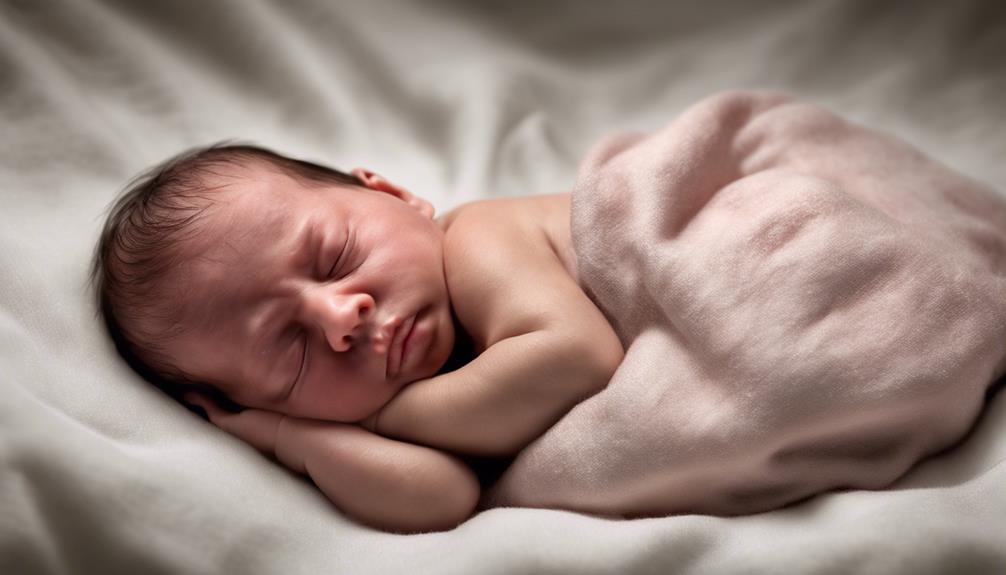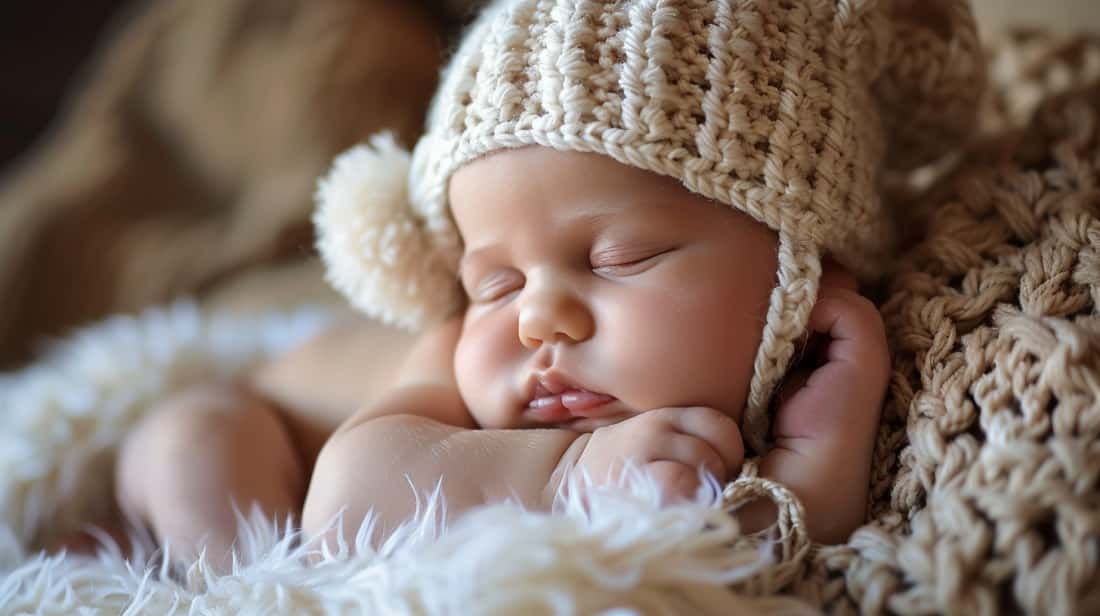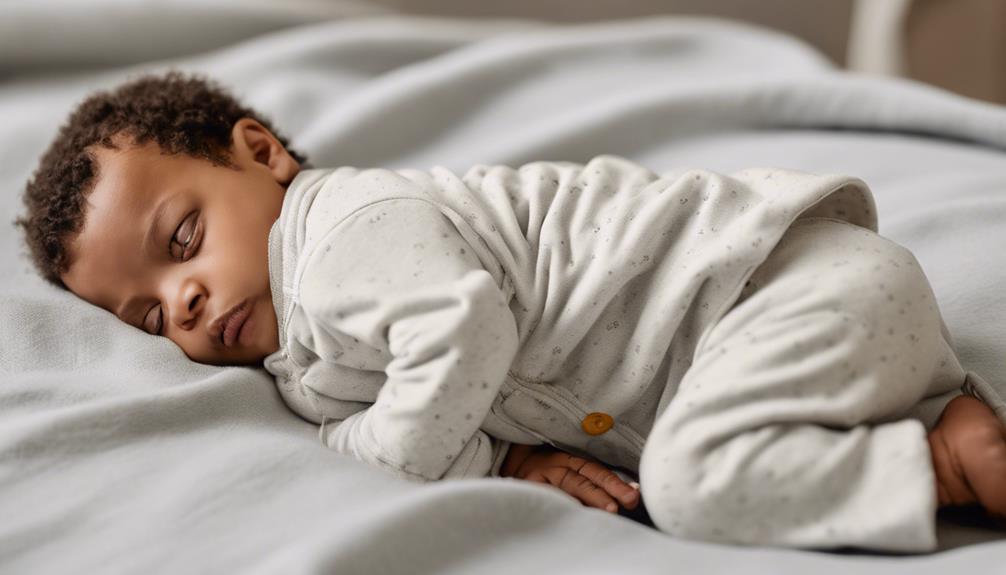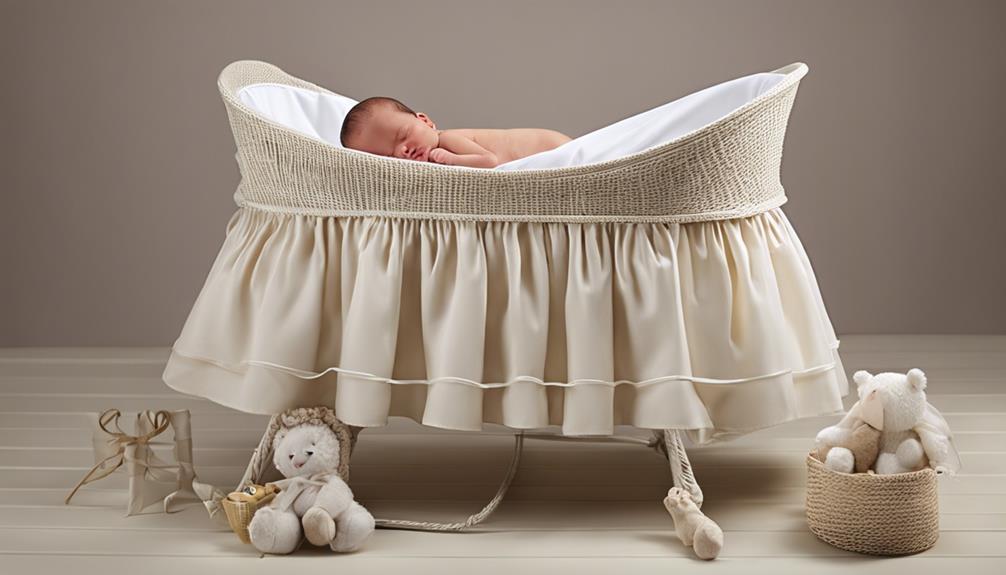As parents, we frequently question why our infants sweat a lot while sleeping, particularly when it appears to be excessive. Are you aware that sweating is a normal physiological response in babies as they regulate their body temperature?
However, there are times when sweating can be a cause for concern. By understanding the reasons behind your baby's sweating, recognizing common triggers, and implementing practical strategies to keep them comfortable, you can help your little one rest peacefully.
Let's explore effective ways to address newborn sweating and make sure your baby sleeps soundly.
Key Takeaways
- Maintain room temperature between 68 to 72°F for optimal comfort.
- Choose lightweight, breathable clothing to prevent excess sweating.
- Ensure proper ventilation in the sleep environment.
- Monitor and adjust room temperature and clothing choices for a sweat-free sleep.
Reasons for Newborn Sweating
When it comes understanding why newborns sweat during sleep, it's essential to reckon with various factors that can contribute to this common occurrence. As babies drift into the night, their bodies undergo deep sleep cycles, which can trigger sweating.
Ensuring the room temperature isn't too high and dressing them appropriately can help prevent excessive sweating. Overdressing or using heavy bedding can lead to increased perspiration during the night.
Additionally, illnesses such as fever or conditions like hyperhidrosis may also cause newborns to sweat while sleeping. Proper ventilation in the room is critical to maintaining a comfortable sleep environment for your baby and reducing the likelihood of sweating.
Common Causes of Newborn Sweating

Newborn sweating during sleep can stem from various common causes such as high room temperature, overdressing, deep sleep cycles, or even excessive crying leading to overheating. Sometimes, medications or illnesses like fever can also play a role in your baby's nighttime perspiration. To help you understand these causes better, let's explore them in more detail:
| Causes of Newborn Sweating | Description |
|---|---|
| High Room Temperature | Overheating due to warm environment. |
| Overdressing | Excessive layers leading to increased body heat. |
| Deep Sleep Cycles | Natural bodily response during certain sleep stages. |
| Excessive Crying | Increased activity and potential overheating. |
When your little one sweats excessively during sleep, it's crucial to monitor the room temperature and dress them in light, breathable clothing. If sweating persists or is accompanied by other concerning symptoms, consulting a doctor is advisable for proper evaluation and guidance.
Strategies to Prevent Baby Sweating

To effectively prevent your baby from sweating excessively during sleep, it's essential to implement appropriate strategies tailored to their comfort and well-being. Maintaining the room temperature between 68 to 72°F can help regulate your baby's temperature and prevent night sweating.
Choosing lightweight and breathable clothing for your baby is another helpful step to make sure they stay comfortable and avoid overheating. Proper ventilation in the room is important to reduce the chances of your baby sweating at night, so make certain there's fresh air circulating.
Monitoring the room temperature using baby monitors or thermometers can help you make quick adjustments as needed to prevent baby sweating while sleeping. It's important to avoid overdressing your baby or using excess bedding; keeping things simple can help them stay cool and comfortable throughout the night.
Red Flags to Watch For

Keeping a close eye for red flags is essential when monitoring your newborn for excessive sweating during sleep. If you notice your baby sweating excessively along with a fever, it could be a sign of an underlying illness that needs medical attention. Additionally, pay attention to any signs of difficulty breathing while your baby sweats at night, as this could indicate a more serious issue. Check your baby's skin during sweating episodes; if it feels hot to the touch, it may suggest overheating or a medical concern that requires prompt evaluation.
Watch out for any signs of lethargy or unusual behavior following episodes of baby sweating. These changes could be indicators of an underlying problem that needs to be addressed by a healthcare provider. It's important to keep track of all concerning symptoms to provide accurate information for medical evaluation and guarantee the well-being of your newborn.
Protecting Your Baby's Skin
During these moments of heightened concern, guaranteeing your baby's skin remains healthy and protected is paramount in promoting their overall well-being. To safeguard your newborn's delicate skin from excessive sweating and potential irritations, it is essential to follow some key practices. To start, opt for gentle cleansing products to maintain skin health and prevent chafing. Additionally, consider using suitable creams to keep your baby's skin dry and protected. Choosing breathable clothing options can help regulate your baby's body temperature and minimize sweating, reducing the risk of overheating during sleep. Avoid overdressing your baby and ensure proper ventilation in the sleep environment to prevent excessive sweating. Below is a handy table summarizing the essential steps to protect your baby's skin effectively:
| Protection Tips | Description | Benefits |
|---|---|---|
| Use Gentle Products | Opt for mild cleansers and suitable creams for baby skin | Prevent irritation |
| Choose Breathable Clothing | Select breathable fabrics to regulate body temperature | Minimize sweating |
| Ensure Proper Ventilation | Maintain a comfortable sleep environment | Reduce excessive sweating |
Frequently Asked Questions
How Do I Stop My Newborn From Sweating at Night?
We can help your newborn stop sweating at night by maintaining a room temperature of 68 to 72°F, dressing them in breathable clothing, and avoiding overdressing or excess bedding. Monitor the room temperature for a comfortable sleep environment.
Is It Normal for a Baby to Sweat on the Head While Sleeping?
Yes, it's normal for babies to sweat on the head while sleeping due to developing sweat glands. Factors like room temperature and clothing can contribute. Monitoring these and seeking advice if concerns persist is essential.
What Causes Excessive Sweating in Newborns?
Excessive sweating in newborns can result from overdressing, hot room temps, or health issues like fever. Monitoring clothing and room settings is essential. Seeking medical advice for persistent sweating or concerning symptoms is wise.
Why Does My Breastfed Baby Sweat so Much?
I acknowledge your concern about your breastfed baby sweating so much. It's common for breastfed babies to sweat during feeds due to physical exertion, temperature regulation, and hormones. Skin-to-skin contact also increases body heat.
Can Using the Wrong Sleep Sack Cause My Newborn to Sweat Excessively?
Choosing the right sleep sack for your newborn is essential to ensure they stay comfortable and safe while sleeping. Using the wrong sleep sack, particularly one that is too warm or made of non-breathable material, can cause excessive sweating and discomfort for your baby. Be sure to select a sleep sack that is appropriate for the temperature and your baby’s needs.
Conclusion
To sum up, helping your newborn stop sweating in sleep is vital for their comfort and well-being. By following the strategies mentioned, such as maintaining a comfortable room temperature and dressing them in breathable clothing, you can create a peaceful sleep environment for your little one.
Remember, a little sweat is normal, but excessive sweating can be a cause for concern. Keep a close eye on your baby's sweating patterns and always consult a doctor if needed.
Your baby's comfort is worth its weight in gold!









